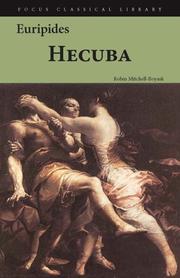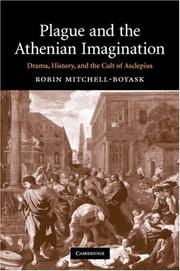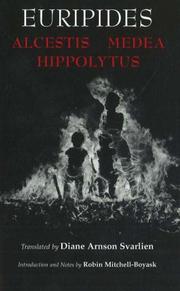| Listing 1 - 5 of 5 |
Sort by
|
Book
ISBN: 9780715636428 0715636421 9781472519634 1472519639 9781472539595 1472539591 Year: 2009 Volume: *7 Publisher: London Duckworth
Abstract | Keywords | Export | Availability | Bookmark
 Loading...
Loading...Choose an application
- Reference Manager
- EndNote
- RefWorks (Direct export to RefWorks)
"The 'Eumenides', the concluding drama in Aeschylus' sole surviving trilogy, the "Oresteia", is not only one of the most admired Greek tragedies, but also one of the most controversial and contested, both to specialist scholars and public intellectuals. It stands at the crux of the controversies over the relationship between the fledgling democracy of Athens and the dramas it produced during the City Dionysia, and over the representation of women in the theatre and their implied status in Athenian society. The "Eumenides" enacts the trial of Agamemnon's son Orestes, who had been ordered under the threat of punishment by the god Apollo to murder his mother Clytemnestra, who had earlier killed Agamemnon. In the Eumenides, Orestes, hounded by the Eumenides (Furies), travels first to Delphi to obtain ritual purgation of his mother's blood, and then, at Apollo's urging, to Athens to seek the help of Athena, who then decides herself that an impartial jury of Athenians should decide the matter. Aeschylus thus presents a drama that shows a growing awareness of the importance of free will in Athenian thought through the mythologized institution of the first jury trial."--Bloomsbury Publishing The "Eumenides", the concluding drama in Aeschylus' sole surviving trilogy, the "Oresteia", is not only one of the most admired Greek tragedies, but also one of the most controversial and contested, both to specialist scholars and public intellectuals. It stands at the crux of the controversies over the relationship between the fledgling democracy of Athens and the dramas it produced during the City Dionysia, and over the representation of women in the theatre and their implied status in Athenian society. The "Eumenides" enacts the trial of Agamemnon's son Orestes, who had been ordered under the threat of punishment by the god Apollo to murder his mother Clytemnestra, who had earlier killed Agamemnon.In the "Eumenides", Orestes, hounded by the Eumenides (Furies), travels first to Delphi to obtain ritual purgation of his mother's blood, and then, at Apollo's urging, to Athens to seek the help of Athena, who then decides herself that an impartial jury of Athenians should decide the matter. Aeschylus thus presents a drama that shows a growing awareness of the importance of free will in Athenian thought through the mythologized institution of the first jury trial

ISBN: 0873527704 Year: 2002 Publisher: New York (N.Y.): Modern language association of America
Abstract | Keywords | Export | Availability | Bookmark
 Loading...
Loading...Choose an application
- Reference Manager
- EndNote
- RefWorks (Direct export to RefWorks)
Mythology, Greek, in literature --- Mythology, Greek, in literature. --- Tragedy --- Tragedy. --- Study and teaching. --- Drama --- Study and teaching --- Euripides --- Criticism and interpretation.

ISBN: 1585101486 Year: 2006 Publisher: Newburyport : Focus,
Abstract | Keywords | Export | Availability | Bookmark
 Loading...
Loading...Choose an application
- Reference Manager
- EndNote
- RefWorks (Direct export to RefWorks)

ISBN: 9780521873451 0521873452 9780511482304 9780521296373 0511378041 9780511378935 0511378939 9780511378041 9786611243470 661124347X 0511482302 1107181194 9781107181199 1281243477 9781281243478 0511377169 9780511377167 0511376227 9780511376221 0511374690 9780511374692 0521296374 Year: 2007 Publisher: Cambridge [etc.] Cambridge University Press
Abstract | Keywords | Export | Availability | Bookmark
 Loading...
Loading...Choose an application
- Reference Manager
- EndNote
- RefWorks (Direct export to RefWorks)
The great plague of Athens that began in 430 BCE had an enormous effect on the imagination of its literary artists and on the social imagination of the city as a whole. In this 2007 book, Professor Mitchell-Boyask studies the impact of the plague on Athenian tragedy early in the 420s and argues for a significant relationship between drama and the development of the cult of the healing god Asclepius in the next decade, during a period of war and increasing civic strife. The Athenian decision to locate their temple for Asclepius adjacent to the Theater of Dionysus arose from deeper associations between drama, healing and the polis that were engaged actively by the crisis of the plague. The book also considers the representation of the plague in Thucydides' History as well as the metaphors generated by that representation which recur later in the same work.
Asklepios (Greek deity) --- Plague in literature. --- Asclépios (Divinité grecque) --- Peste dans la littérature --- Asclépios (Divinité grecque) --- Peste dans la littérature --- Drama --- Greek drama (Tragedy) --- Literature and society --- Plague in literature --- Drama, Modern --- Plays --- Stage --- Literature --- Dialogue --- Greek drama --- Literature and sociology --- Society and literature --- Sociology and literature --- Sociolinguistics --- Cult --- Social aspects&delete& --- History --- History and criticism --- Themes, motives&delete& --- Philosophy --- Social aspects --- Dramas --- Dramatic works --- Playscripts --- Tragédie grecque --- Littérature et société --- Théâtre (Genre littéraire) --- Cult. --- History and criticism. --- Themes, motives --- Culte --- Histoire et critique --- Thèmes, motifs --- Aspect social --- Aesculapius (Roman deity) --- History. --- Asklepios --- Asclepius --- Asclepio --- Ασκληπιος --- Asclepiu --- Asklepi --- Асклепій --- Asklepiĭ --- Асклепий --- Asklepije --- Asclepi --- Æskulap --- Asklepio --- Asclépios --- Esculapio --- אסקלפיוס --- Asḳlepiyos --- Asḳlepyos --- Aesculapius --- Asklēpijs --- Asklepijas --- Asklepijus --- Eskulapas --- Aszklépiosz --- Асклепиј --- Asklepij --- Ескулап --- Eskulap --- アスクレーピオス --- Asukurēpiosu --- Asklepiy --- Asklepiu --- Асклепије --- 阿斯克勒庇俄斯 --- Asikeleibiesi --- Eshmun --- Arts and Humanities --- Asclépios (divinité grecque) --- Esculape (divinité greco-romaine)

ISBN: 9780872208223 Year: 2007 Publisher: Indianapolis (Ind.) : Hackett,
Abstract | Keywords | Export | Availability | Bookmark
 Loading...
Loading...Choose an application
- Reference Manager
- EndNote
- RefWorks (Direct export to RefWorks)
Mythology, Greek --- Alcestis, --- Euripides --- Hippolytus, --- Medea, --- Translations into English.
| Listing 1 - 5 of 5 |
Sort by
|

 Search
Search Feedback
Feedback About UniCat
About UniCat  Help
Help News
News